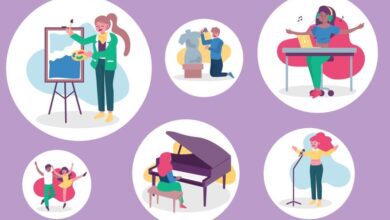Non formal education institutions meaning in Urdu


When it comes to education, we often think of traditional schools and universities as the main sources of knowledge. However, there are other types of educational institutions that play an important role in shaping individuals’ skills and knowledge. One such type is non formal educational institutions. This term may be unfamiliar to many, especially in the Urdu language. In this blog post, we will demystify the non formal education institutions meaning in Urdu and explore their significance in the education system. So let’s dive in and learn more about these institutions and how they contribute to the learning process.
Understanding the Concept of Non Formal Education
Non-formal education, an often misunderstood term, essentially refers to the array of educational activities that take place outside the formal, rigidly structured school system. This type of learning takes a different, more flexible approach. It caters to specific educational needs, providing learner-centric experiences, allowing individuals to learn at their own pace, in their own style. In the Urdu language, non-formal education is expressed as ‘غیر رسمی تعلیم,’ a term that brings together ‘غیر رسمی,’ denoting ‘non-formal,’ and ‘تعلیم,’ signifying ‘education.’ With its learner-centric approach, this educational structure provides an alternative avenue for learning, sidestepping many of the constraints tied to traditional education systems.
This accessible form of learning presents an opportunity to those who might find themselves restricted from conventional educational platforms due to a myriad of reasons, be it economic, geographical, cultural, or linguistic barriers. It’s a key player in educational inclusivity, especially within Urdu-speaking communities, enabling them to gain knowledge and skills in an environment that respects and caters to their unique needs and cultural nuances.
Importance of Non Formal Educational Institutions
Non-formal educational institutions serve as a lifeline to countless individuals in Urdu-speaking communities who find themselves unable to benefit from traditional educational systems. They act as a bridge to knowledge and skills development, providing a critical link to progress and opportunity. Often, traditional schools may not be feasible options due to factors such as geographic location, economic circumstances, or cultural restrictions. This is where non-formal educational institutions step in, offering an accessible learning avenue that is not confined by these barriers.
In the context of the Urdu-speaking world, the role these institutions play becomes even more significant. They carve out a culturally relevant and language-sensitive educational space, offering the opportunity for Urdu speakers to learn and grow without feeling alienated by language or cultural barriers that might exist in conventional education settings. non formal education institutions meaning in urdu, therefore, serve a dual purpose: facilitating educational opportunities and preserving the richness of the Urdu language and culture. By delivering education in a familiar language and cultural context, these institutions are able to foster a more engaging, immersive, and ultimately, effective learning experience.
The importance of these institutions
However, the importance of these institutions extends beyond just academic learning. They are crucial social spaces, nurturing a sense of community, mutual respect, and collaboration among learners. These institutions often play a pivotal role in fostering a learning culture within communities, bringing people together in their shared quest for knowledge, and creating a ripple effect that extends the benefits of education far beyond the classroom walls.
In essence, the importance of non-formal educational institutions, particularly within Urdu-speaking communities, cannot be overstated. They serve as powerful catalysts for educational inclusivity, cultural preservation, community building, and social progress.
The Composition of Non Formal Educational Institutions in Urdu
non formal education institutions meaning in urdu serving the Urdu-speaking population span a broad spectrum of learning initiatives. They are diverse and multifaceted, catering to the specific educational needs of various groups within the community. Some may focus on providing adult literacy classes, enabling Urdu speakers who have missed out on traditional education to acquire crucial literacy skills. Others might offer vocational training programs, equipping individuals with practical skills for specific trades or industries.
Moreover, many of these institutions champion community-based educational initiatives, tapping into the power of collective learning and fostering a strong sense of community. From after-school programs for children in disadvantaged areas to workshops on traditional crafts that preserve cultural heritage, these institutions are as varied as the people they serve.
Their composition, therefore, is not limited to a single structure or model. Instead, it’s a dynamic constellation of educational programs, each tailored to cater to unique learning requirements within the Urdu-speaking community. Whether it’s helping adults learn to read and write, imparting professional skills to boost employability, or fostering community learning through shared experiences, these institutions are anchored by one common goal: to make education accessible and meaningful for all Urdu speakers, regardless of their circumstances.
These institutions are not just about teaching and learning. They also serve as important cultural anchors within the community. By offering education that is rooted in the Urdu language and culture, they play a key role in preserving and promoting the rich heritage of Urdu-speaking communities. So, while their composition may vary, their commitment to delivering culturally sensitive, inclusive education remains steadfast.
The Uniqueness of Non Formal Education in Urdu
The essence of non-formal education in Urdu lies not only in its learner-centric approach but also in its cultural resonance. By deeply embedding Urdu language and cultural elements in the educational process, these institutions offer a learning experience that is both accessible and culturally relevant. Think of a course that not only imparts key skills but also weaves in stories from Urdu literature, or a workshop that not only teaches a trade but also highlights its connection to traditional Urdu arts and crafts. That’s the distinct flavor that non-formal education in Urdu brings to the table.
This context-specific learning environment amplifies engagement and retention, ensuring that education is not just about knowledge acquisition, but also about cultural preservation and enrichment. This unique fusion of language-sensitive learning with cultural immersion sets non-formal education in Urdu apart. It goes beyond the traditional norms of education, creating a learning experience that not only teaches but also resonates with the students on a deeper cultural level. Therefore, non-formal education in Urdu is not merely an alternative to traditional learning; it’s a unique educational approach that is deeply intertwined with the rich tapestry of Urdu language and culture.
Challenges Faced by Non Formal Educational Institutions
Navigating the world of non-formal education isn’t without its fair share of obstacles. While these institutions strive to provide accessible, tailored education, they often grapple with a myriad of challenges. One such issue is the absence of a standardized curriculum across these institutions. This lack of uniformity in educational content can make it difficult to gauge the quality of education being imparted and measure the progress of learners.
Funding constraints are another common hurdle. Often, these institutions are functioning on tight budgets, struggling to secure sufficient resources to maintain their operations, let alone expand them. These financial challenges can limit the reach of non-formal education, leaving some potential learners out of its ambit.
Another critical challenge lies in the recognition of credentials from non formal education institutions meaning in Urdu. Unlike formal schools, the certificates and qualifications from non-formal educational institutions often don’t carry the same weight, potentially hindering the opportunities available to learners.
And finally, there’s the shortage of skilled educators proficient in Urdu, equipped to deliver high-quality, culturally sensitive education. The scarcity of such teachers can potentially affect the quality of education imparted.
In spite of these challenges, the dedication of these institutions to offer a flexible, inclusive form of learning remains steadfast. Their resilience is a testament to the vital role they play in Urdu-speaking communities, providing educational opportunities that resonate with the cultural fabric of the learners.
The Future of Non Formal Educational Institutions in Urdu
The landscape of non-formal education in Urdu holds considerable potential for growth and innovation. As the awareness of its significance escalates, so does the demand for more inclusive, culturally attuned education. This signifies a broadened scope and deeper impact for these institutions in the years to come. Technology promises to be a potent ally in this journey, offering novel ways to navigate the challenges that these institutions face. Imagine interactive online courses conducted in Urdu or digitally preserved traditional crafts tutorials — the possibilities are endless. Overcoming resource limitations, digital technology can open up a world of learning for Urdu speakers, regardless of their geographical location or economic circumstances.
Moreover, online credentials could potentially lead to broader acceptance and recognition of qualifications earned through non-formal education, creating a ripple effect of opportunities for learners. The future, thus, holds exciting prospects for non-formal educational institutions in Urdu. It’s a vision where education is not just accessible, but also resonates with the rich cultural fabric of Urdu-speaking communities. Ultimately, it’s about building a future where every Urdu speaker, regardless of their circumstances. Has the opportunity to learn and grow in a way that’s most meaningful to them. This paints a future that’s as inspiring as it is promising, signaling the onward journey of non-formal education in the Urdu-speaking world.


Conclusion
In sum, the role of non-formal educational institutions within the Urdu-speaking world is truly pivotal. Providing a dynamic and learner-focused alternative to traditional education. They address the distinctive educational needs of Urdu speakers, tailoring the learning journey to their individual circumstances and cultural nuances. While these institutions navigate their share of challenges, their future shines bright with promise. Particularly with the integration of technology and a widening awareness of their value in education. Embracing technology can pave the way for innovative learning methods, overcoming limitations and broadening the reach of these institutions. Non-formal education in Urdu is not just about fostering learning. It’s about preserving and promoting the rich tapestry of Urdu language and culture, empowering individuals and communities along the way.
It’s an intricate blend of education, culture, and community building, knitting together the threads of knowledge, tradition, and progress. Therefore, comprehending the concept of non-formal education in Urdu is imperative for all stakeholders in the field of education. It’s a dynamic landscape, ripe with possibilities, catalyzing meaningful changes in the realm of education and beyond. So here’s to a future where every Urdu speaker, regardless of their circumstances. Is granted the opportunity to learn and grow in a manner that resonates with them, a future that’s as empowering as it is enlightening.




Thanks for sharing. I read many of your blog posts, cool, your blog is very good.